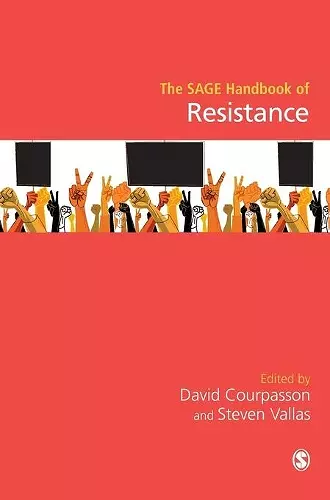The SAGE Handbook of Resistance
Steven Vallas editor David Courpasson editor
Format:Hardback
Publisher:Sage Publications Ltd
Published:3rd Oct '16
Currently unavailable, and unfortunately no date known when it will be back

Chosen by Library Journal as one of the best reference texts of 2016.
Occupy. Indignados. The Tea Party. The Arab Spring. Anonymous. These and other terms have become part of an emerging lexicon in recent years, signalling an important development that has gripped many parts of the world: millions of people are increasingly involved, whether directly or indirectly, in movements of resistance and protestation.
However, resistance and its conceptual "companions", protest, contestation, opposition, disobedience and mobilization, all seem to be still mostly seen in public and private discourses as illegitimate and problematic forms of action. The time is, therefore, ripe to delve into the concerns, themes and legitimacy.
The SAGE Handbook of Resistance offers theoretical essays enabling readers to forge their own perspectives of what "is" resistance and emphasizes the empirical and experiential dimension of resistance - making strong choices in terms of how contemporary topics related to resistance help to rethink our societies as "protest societies". The coverage is divided into six key sub-sections:
- Foundations
- Sites of Resistance
- Technologies of Resistance
- Languages of Resistance
- Geographies of Resistance
- Consequences of Resistance
Resistance takes many forms, and is aimed in many directions. The editors have given us a powerful new language for grasping this diversity by cleverly dividing the handbook into foundations, sites, technologies, languages, and geographies of resistance. This book should attract wide attention and will reverberate across many disciplines.
-- James M. JasperThe Editors have assembled a collection of expert articles traversing sources in time and space on what it is to ‘resist’. These argue that resistance studies is an interdisciplinary area looking, in part, at ‘the art of the weak’, ‘the weapons of the weak’, ‘style warfare’, ‘the great refusal’, ‘inaction’, and ‘rebellion’. On (or perhaps in) the other hand, there is a consideration of ‘co-optation’, ‘accommodation’ and ‘commodification’ as all equally associated with resistance. The articles move through different depths of visibility e.g. resistance is ‘underground’, ‘rhizomatic’, ‘grass roots’, ‘astroturf’ or as fully ‘out in the open’. But all are aware of the context-specific nature of resistance in a major text that will illuminate many contemporary features of a world in which power differentials appear to be increasing and where the 1% may yet come to fear a call from a resistant mob armed with pitchforks.
-- Gibson BurrellResistance is the new normal. Anti-elite resistance in politics, both nationally as in Brexit and organisationally, in the role of Trump and Corbyn in their respective parties as well as in social movements globally and in the interstices of organisations that seem increasingly out of kilter with the spirit of the times is a major contemporary phenomenon. While no relations of power are ever alike that are resisted and no resistance follows universal scripts – both power and resistance are highly contextual – the Handbook of Resistance offers an invaluable resource understanding the dialectical relations of power and resistance theoretically and through many insightful empirical analyses. I recommend it as essential reading for the social sciences.
-- Stewart CleggIn conceiving and making available this rich interdisciplinary and globally-oriented handbook, Courpasson and Vallas are doing a great service to social scientists committed to social change. This book is an important resource that should become widely used and widely referenced.
-- Michele La
ISBN: 9781473906433
Dimensions: unknown
Weight: 1120g
530 pages